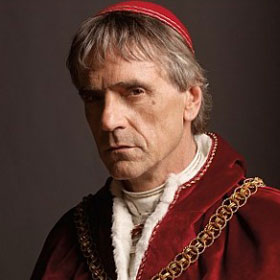The Borgias Delivers Sumptuous Finale
The Borgias wrapped up its first season with the episode "Nobody,” concluding Showtime’s newest hit series, this one depicting the quasi-history of the Borgias papacy. Oscar winner Jeremy Irons stars as Rodrigo Borgia, the conniving patriarch who buys, bribes, and threatens his way into power. For those who might not remember, the season premiere began with the dying words of Pope Innocent VIII in 1492 regarding the state of the papacy: "It was pure once. We have all sullied it with our greed and lechery. Which of you will wash it clean?"
It was clear from the beginning that Rodrigo Borgias certainly would not be washing anything clean, as the audience watched him take papal “greed” and “lechery” to an all time high, establishing himself as possibly the most corrupt Pope in history. Also known as “the original crime family,” the 15th century papal family subsequently spends almost the entire season committing every sin imaginable. Always ready to plot, conspire, and kill to maintain their power and supposed prestige.
Come the finale Rodrigo manages to fend off Charles, King of France, and stop his ruthless, bloodthirsty army from pillaging Rome. The preceding episodes showing King Charles sacking Milan and massacring the pope’s army with their cannons, leaving both Rome and the pope defenseless. In the midst of this impending doom, most of the cardinals flee like rats from a sinking ship but it is the Pope’s aptitude to scheme and manipulate that contributes to the rescue of Rome.
Rodrigo replaces his shiny costumes and luxurious jewels with a simple robe and plain pair of sandals, impressing King Charles with his seeming modesty. Yet it was the beautiful, pregnant, and incredibly sharp Lucrezia who takes advantage of her prisoner status, charming Charles into sparing Rome and brokering a meeting with her father. Falling helplessly to her charm, Charles decides to forgo Rome and claim Naples, a city decimated by plague and overflowing with dead corpses.
As Charles lays down France’s entitlement to this desolate city of corpses, Rodrigo rejoices in the birth of his grandchild, Lucrezia's son by her young lover, not her offensive and abusive husband. Rodrigo contrives the despicable King Sforza into accepting an annulment on the basis of his inability to consummate his marriage to Lucrezia on their wedding night. Later King Sforza tries to disprove his impotence in front of the pope and his cardinals.
The character who best exemplifies the immorality and ruthless nature of the Borgia crime family is Cesare Borgia, a cardinal who has sex with women, flirts with his teenage sister, murders his opponents, and devises remarkable bribery. After all, it is a historic truth that Cesare is the man whom after the term "Machiavellian" was first originated. Niccolo Machiavelli served as a sort of political advisor to the Borgia family and recognized the effectiveness of the family members in seizing and maintaining their power, a feat especially impressive in this time of ineffectual infighting among the Italian cities.
Machiavelli based The Prince on the life of Cesare Borgia, a discourse in which Machiavelli argues that the most successful kings were not the ones who acted according to decrees of law, justice, or conscience, but those willing to do whatever was necessary to preserve their own power and consequently, indirectly preserve the stability of the state. His title, "The Prince," in effect, is a subtle ridicule of the notion that rulers should be noble in their character. But this is the ultimate point of The Borgias; they are a papal family, chosen by god, the embodiment of worldly holiness, yet they are utterly depraved of morality, humility, or any other virtue. The Borgias will be coming back for a second season in 2012, so get excited to see another season of the violent, deceitful, and sex-filled ways of god’s ordained 16th century papacy.
RELATED ARTICLES
Get the most-revealing celebrity conversations with the uInterview podcast!






Leave a comment